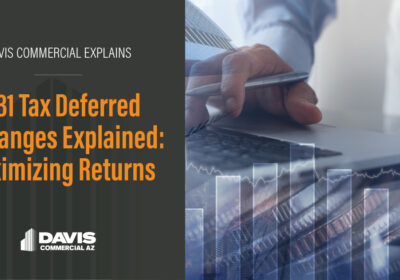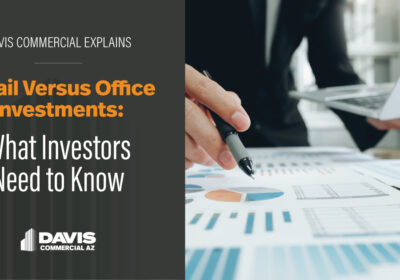The Power of a 1031 Exchange

You’ve successfully navigated the turbulent waters of purchasing your first commercial property. You’re several years in and business is booming. Bravo! You know you need more space but want to research what happens when you buy a bigger building. Taxes and depreciation and profit all come into play but how?
We aren’t lawyers or tax accountants, but we have assisted hundreds of clients with this type of transaction. If you are seeking a simple overview before you dip your toe in the water, we’ve got you! We will cover the basic concept of a 1031 Tax Deferred Exchange (1031), the lingo and what to look for in the new property. Let’s get started.
First things first, build your team with trusted, qualified service providers. Since this isn’t your first rodeo you want to review the experience you had with the commercial real estate professional that handled the purchase of your current building.
- Was he prepared?
- Did he anticipate the sea of minutiae involved in buying a building?
- Were his recommendations spot on or a dead end?
If your honest answers were more negative than positive, consider starting over with a fresh face. You know so much more now than you did then, and using your Aunt Sally’s son-in-law Steven, a residential realtor, to buy your current building may not have been the best idea.
What is a 1031 Exchange?
“A section 1031 exchange is a tax deferment strategy that allows real estate investors to sell one or more properties and use the proceeds to immediately invest in other properties, without paying capital gains taxes on the sale amount of the relinquished properties.” (Definition from TFS Properties Inc. in AZ, www.tfsproperties.com)
The property being purchased/exchanged must be similar and of equal or greater value than the one being sold. There are firm deadlines as to when to identify the replacement property and acquire the new property. The new building must be chosen within 45 days of closing on the sale of the original property and the purchase must close within 180 days of closing on the original property. The clock starts ticking on the close of escrow of the original property.
The real estate must be a business use or investment not residential. Keep in mind that the title to each property must be in the same name. You should also know that you can’t pocket any profit or equity (referred to as “boot”) in the transaction. These strict rules sound scary but won’t be with the right commercial estate professional.
“Many taxpayers are surprised to find that they may be hit with up to four different levels of taxation when selling appreciated real property (Depreciation Recapture, Federal Capital Gain, State Tax, & Net Investment Income Tax). If done correctly, a 1031 exchange allows for the deferment of all four potential levels.” Brandon Hughes from Asset Preservation, Inc. told us. “This deferment can not only save you from paying tax in the current year but can increase your purchasing power for future replacement properties. Remember, pre-tax dollars multiply your purchasing power when compared to after-tax dollars. The 1031 exchange is a fantastic tool for reimagining your real estate.”
With such a stringent timeline, it’s best to line up a qualified third party 1031 exchange intermediary (QI), experienced lawyer and accountant early on. They should be ready to rock and roll as soon as you know when your for-sale property will close, because you only have 45 days to select a replacement property. Qualified intermediaries aren’t required by law to be regulated, so you want to be very selective. As always, your trusted real estate professional will be able to provide a few options to choose from.
What is a QI?
A Qualified Intermediary (QI), also referred to as an Accommodator or Facilitator, is a neutral third party who is required when doing a 1031 exchange. They are the person or company who holds funds from the relinquished property. They must abide by regulations set by the Internal Revenue Code Section 1031 tax-deferred exchanges.
“Choosing a Qualified Intermediary (QI) is an important decision and imperative for the security of your exchange proceeds. QI due diligence should include asking about their experience and expertise,” said Brandon Hughes. “Do they have attorneys and accountants on staff that understand the IRS rules? Due diligence should foremost include verifying how they will hold your money. Are your proceeds backed by a large creditworthy entity with strong financials and controls? Where do they hold your funds? Does your QI segregate exchanger accounts? Does your QI have sufficient coverage (fidelity bond, Errors & Omissions, etc.)? A good QI will ensure a smooth exchange process.”
Let’s review:
- Choose a real estate professional to sell your building and find you an awesome like kind business or investment property with an equal or greater value than your current property.
- Inform your title company, lawyer, financial planner, and accountant of your intent to sell/buy real estate as a 1031 exchange. Title of the replacement must be in the same name as the relinquished property.
- Find an experienced QI who comes highly recommended, and you trust.
- Decide on the new property within 45 days of selling/closing on the original property.
- Close on the new property within 180 days of closing on the original property.
This seems like a lot to manage but understanding the entire process ahead of time will help you focus on each step without getting overwhelmed. With a little planning, preparation, and the right professionals to guide you, your first 1031 exchange should be smooth sailing.
 About Andrea Davis
About Andrea Davis
Davis Commercial AZ is committed to helping our clients realize their commercial real estate vision. With more than 25 years of experience, we ensure a premier standard of services. Our dedication to our clients is at the center of everything we do. In just five years, we closed more than $280 million in client transactions, half of which transpired during the pandemic. We pride ourselves on working on your behalf to secure all possible incentives in this marketplace. Davis Commercial AZ is owned by Andrea Davis, CCIM, a respected industry leader whose breadth of knowledge stretches from developers to landlords to buyer/tenant representation and investments. Davis has won numerous awards, is in the top 10 category for Office Brokerage in Ranking Arizona and is a regular educational blogger for theBrokerList. Her book, SimpLEASEity™, neutralizes leasing fears and is the first in a series of commercial real estate guidebooks. Her next book, Simply Own It, the American Dream, is scheduled to be released this year. For more information visit www.daviscreaz.com.
About Brandon Hughes
Brandon Hughes has an extensive accounting background and is a Division Manager with Asset Preservation, Inc. (API) www.apiexchange.com. API is a leading IRC §1031 Qualified Intermediary and has successfully facilitated over 200,000 tax-deferred exchanges throughout the nation. Brandon can be reached at (480) 392-4952 or brandon@apiexchange.com.





